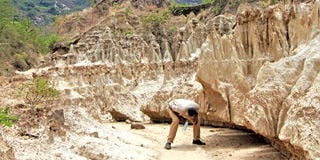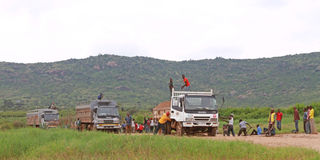Premium
Sands of Makueni rivers leave trail of destruction

A man examines an eroded section of River Kwa Ngesu in Makueni County.
What you need to know:
- From the time the destructive activity was banned 14 years ago, sand has been filling the river.
- Although the county government has been removing the excess sand in most of the affected rivers and dams, the Covid-19 pandemic and wrangling among residents has slowed down the process.
When sand-harvesting was stopped along River kwa Ngesu years ago, everybody was happy. Residents of Mutiswa and neighbouring villages could finally have plenty of water.
But, things did not go as planned. Sand has now accumulated in the river, wreaking havoc for the past few years, especially when it rains. Residents now want to harvest the sand.
From the time the destructive activity was banned 14 years ago, sand has been filling the river.
Residents are now tired of frequent sand flooding and silting in dams. This is not the only river in Makueni that is silting up, exposing riparian communities to the flooding every time it rains. There are other rivers.
Although the county government has been removing the excess sand in most of the affected rivers and dams, the Covid-19 pandemic and wrangling among residents has slowed down the process.
Mbeyu Mutua, 70, is among the affected residents, who are now calling on the county government to act swiftly to prevent an environmental catastrophe.
Sand floods
Ten months ago, Mbeyu and many of her neighbours watched helplessly as the river broke its banks and marooned their homesteads. When the flooding stopped, tonnes of sand had been deposited in their houses and farmlands.
They now live in fear of suffering a similar disaster, especially now that the short rains are underway.
“We have been erecting dykes made up of gunny bags filled with sand and placing thorny branches along what used to be the river banks to direct flood waters away from the farmlands,” Mbeyu told HealthyNation at her home in Munyuni village, the hotspot of the sand floods.
But, the seasonal river can no longer be controlled by dykes and branches. "The government should come to our rescue urgently and scoop the excess sand from the river,” said the farmer.
The county government has been scooping excess sand in other rivers as well as sensitising the communities on the need to plant trees and avoid cultivating along riparian zones to prevent soil erosion.

Youths load lorries with sand during an emergency removal of the excess at a flooded section of River Marwa in Makueni County.
The desperate appeal at Mutiswa speaks to the unprecedented environmental disaster which Makueni governor Kivutha Kibwana likened to an invading army.
Sand mining
“The sand has become problematic to both the communities in the regions where it originates, causing deep gullies and sleepless nights to residents, and those who have seen sand deposits take over their homesteads and farmlands like an invading army,” he said recently during a crisis meeting at Barazani Girls High School.
Barazani is one of the schools affected.
Halinishi Yusuf, an environmentalist, also blames the abnormal sand accumulation on deforestation and encroachment of the riparian zones.
Months after Prof Kibwana’s administration came to power, it scaled up the sand conservation drive by mounting an aggressive campaign against commercial exploitation of sand from rivers.
The idea was to restore river basins which had been turned into canyons by years of wanton sand mining and, in the short term, conserve sand which acts as a water capsule.



